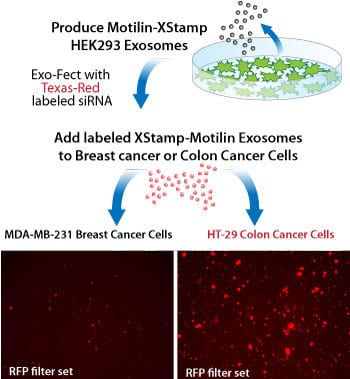XStamp™-Motilin Lentivector for Targeting Exosomes to GI cells
- Display motilin on exosome surfaces
- Target GI cells
- Create stable XStamp-Motilin cell lines
Products
| Catalog Number | Description | Size | Price | Quantity | Add to Cart | |||
|---|---|---|---|---|---|---|---|---|
| XSTP720PA-1 | XStamp GI tract targeting lentivector - MLN exosomes target the Motilin receptor | 10 µg | $819 |
|
||||
Overview
Overview
Putting exosomes to work: Target exosomes to GI cells Use exosomes to deliver protein, RNA, DNA, or small molecule cargo to GI cells with XStamp-Motilin. The patented XStamp technology is an optimized, exosome surface display system that efficiently places protein sequences on exosomal surfaces. The XStamp-Motilin Lentivector fuses the peptide hormone motilin the XStamp tag, ensuring that exosomes display motilin on their outer surface. Exosomes made from cells transfected or transduced with the XStamp-Motilin Lentivector will now be targeted to motilin receptor-expressing cells, which are exclusively gastrointestinal cells.- Display motilin on exosome surfaces
- Target GI cells
- Create stable XStamp-Motilin cell lines
 SBI also offers a selection of pre-built targeting XStamp Lentivectors, as well as a clone-your-own XStamp Cloning and Expression Vector:
SBI also offers a selection of pre-built targeting XStamp Lentivectors, as well as a clone-your-own XStamp Cloning and Expression Vector:
| Cat.# | Specificity | Targeting Ligand Used |
|---|---|---|
| XSTP710PA-1 | Clone-your-own | You decide |
| XSTP720PA-1 | GI tract cells | Motilin |
| XSTP721PA-1 | Neural cells | NCAM |
| XSTP722PA-1 | Brain cells | BHP1 |
| XSTP723PA-1 | Cancer cells | GE11 |
| XSTP724PA-1 | Breast cancer cells | HER2 |
| XSTP725PA-1 | Antigen-presenting cells | CD40L/CD154 |
| XSTP726PA-1 | Immune cells | IL-2 |
References
How It Works
How It Works
Engineering exosomes with specific surface proteins
XStamp is based upon a C-terminal fusion of the C1C2 domain from the protein MFG-E8, which is targeted to the exosome surface. Protein sequences that are fused to the XStamp tag will efficiently display the protein ligand fusion on the surfaces of secreted exosomes.
Supporting Data
Supporting Data
See XStamp targeting in action
Figure 1. XStamp with motilin specifically targets exosomes to GI cells. Motilin is a 22-amino acid polypeptide hormone that binds to the motilin receptor, which is exclusively expressed in the intestine. XStamp with motilin can be used to target exosomes to GI cells. METHODS: The XStamp-Motilin construct (Cat.# XSTP720PA-1) was transfected into HEK293 cells and after 48 hours, the exosomes were isoalted using ExoQuick-TC. The next day, the XStamp-Motilin exosomes were Exo-Fected with a Texas-Red-labeled siRNA to monitor exosome docking and delivery. The transfected XStamp-Motilin exosomes were then added to MDA-MB-231 Breast Cancer Cells (motilin receptor negative) and to HT-29 Colon Cancer Cells (motilin receptor positive). The cells were imaged after 24 hours for uptake of the Texas-Red-labeled siRNA delivery from the XStamped exosomes. The HT-29 colon cancer cells that are motilin receptor positive took up the XStamp-Motilin exosomes at a much higher rate than the MDA-MB-231 Breast Cancer (motilin receptor negative) cells.
FAQs
Documentation
Citations
Related Products
Products
| Catalog Number | Description | Size | Price | Quantity | Add to Cart | |||
|---|---|---|---|---|---|---|---|---|
| XSTP720PA-1 | XStamp GI tract targeting lentivector - MLN exosomes target the Motilin receptor | 10 µg | $819 |
|
||||
Overview
Overview
Putting exosomes to work: Target exosomes to GI cells Use exosomes to deliver protein, RNA, DNA, or small molecule cargo to GI cells with XStamp-Motilin. The patented XStamp technology is an optimized, exosome surface display system that efficiently places protein sequences on exosomal surfaces. The XStamp-Motilin Lentivector fuses the peptide hormone motilin the XStamp tag, ensuring that exosomes display motilin on their outer surface. Exosomes made from cells transfected or transduced with the XStamp-Motilin Lentivector will now be targeted to motilin receptor-expressing cells, which are exclusively gastrointestinal cells.- Display motilin on exosome surfaces
- Target GI cells
- Create stable XStamp-Motilin cell lines
 SBI also offers a selection of pre-built targeting XStamp Lentivectors, as well as a clone-your-own XStamp Cloning and Expression Vector:
SBI also offers a selection of pre-built targeting XStamp Lentivectors, as well as a clone-your-own XStamp Cloning and Expression Vector:
| Cat.# | Specificity | Targeting Ligand Used |
|---|---|---|
| XSTP710PA-1 | Clone-your-own | You decide |
| XSTP720PA-1 | GI tract cells | Motilin |
| XSTP721PA-1 | Neural cells | NCAM |
| XSTP722PA-1 | Brain cells | BHP1 |
| XSTP723PA-1 | Cancer cells | GE11 |
| XSTP724PA-1 | Breast cancer cells | HER2 |
| XSTP725PA-1 | Antigen-presenting cells | CD40L/CD154 |
| XSTP726PA-1 | Immune cells | IL-2 |
References
How It Works
How It Works
Engineering exosomes with specific surface proteins
XStamp is based upon a C-terminal fusion of the C1C2 domain from the protein MFG-E8, which is targeted to the exosome surface. Protein sequences that are fused to the XStamp tag will efficiently display the protein ligand fusion on the surfaces of secreted exosomes.
Supporting Data
Supporting Data
See XStamp targeting in action
Figure 1. XStamp with motilin specifically targets exosomes to GI cells. Motilin is a 22-amino acid polypeptide hormone that binds to the motilin receptor, which is exclusively expressed in the intestine. XStamp with motilin can be used to target exosomes to GI cells. METHODS: The XStamp-Motilin construct (Cat.# XSTP720PA-1) was transfected into HEK293 cells and after 48 hours, the exosomes were isoalted using ExoQuick-TC. The next day, the XStamp-Motilin exosomes were Exo-Fected with a Texas-Red-labeled siRNA to monitor exosome docking and delivery. The transfected XStamp-Motilin exosomes were then added to MDA-MB-231 Breast Cancer Cells (motilin receptor negative) and to HT-29 Colon Cancer Cells (motilin receptor positive). The cells were imaged after 24 hours for uptake of the Texas-Red-labeled siRNA delivery from the XStamped exosomes. The HT-29 colon cancer cells that are motilin receptor positive took up the XStamp-Motilin exosomes at a much higher rate than the MDA-MB-231 Breast Cancer (motilin receptor negative) cells.


